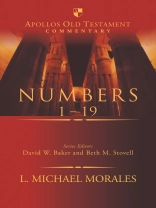This detailed and comprehensive commentary by L. Michael Morales sheds fresh light on a part of the Bible often referenced yet rarely preached and understood.
Often overlooked and regularly misunderstood, the Book of Numbers is a daunting prospect for scholars, preachers and students. It covers part of the Israelites’ wilderness years between Egypt and the land of the promise – seemingly very different to and detached from our modern context. Yet God’s covenant love remains the same, and the book of Numbers remains extremely relevant for ecclesiology and for the church’s life within the already-not yet of the present ‘wilderness’ era.
In his magisterial new commentary, Morales carefully demonstrates the ongoing relevance of Numbers, it’s positive vision for life and the surprising challenge it offers to contemporary Christians. This detailed and comprehensive commentary sheds fresh light on a part of the Bible often referenced yet rarely preached and explained.
The Apollos Old Testament Commentary aims to take with equal seriousness the divine and human aspects of Scripture. It expounds the books of the Old Testament in a scholarly manner, accessible to non-experts, and it shows the relevance of the Old Testament to modern readers. Written by an international team of scholars, these commentaries are intended to serve the needs of those who preach from the Old Testament, as well as scholars and all serious students of the Bible.
Volume 1 begins with an Introduction which gives an overview of the issues of date, authorship, sources and outlines the theology of the book, providing pointers towards its interpretation and contemporary application. An annotated Translation of the Hebrew text by L. Michael L. Morales forms the basis for his comments.
Within this commentary on Numbers 1-19, Form and Structure sections examine the context, source-critical and form-critical issues and rhetorical devices of each passage. Comment sections offer thorough, detailed exegesis of the historical and theological meaning of each passage, and Explanation sections offer a full exposition of the theological message within the framework of biblical theology and a commitment to the inspiration and authority of the Old Testament.
สารบัญ
Illustrations ix
Editors’ preface xi
Author’s preface xiii
Abbreviations xv
Introduction 1
1. The ‘soul’ of Numbers: leadership of the covenant community 3
1.1. The consecration of the Dwelling in Exodus, Leviticus
and Numbers 4
1.2. Leviticus and Numbers in relation to the ending of
Exodus 6
1.3. Numbers 9:15-23 as reversal of Exodus 33 8
1.4. Numbers and Deuteronomy 9
2. The story of Numbers: the Camp of Israel 12
2.1. The Camp of Israel is created within the context of the
Sinai revelation 14
2.2. The Camp of Israel as the culmination of the Sinai
covenant 15
2.3. The Camp of Israel is the paradigm for the ideal of
covenant community 19
2.4. The breastplate of the high priest 21
2.5. The Camp of Israel and the signs of the zodiac 22
2.6. The Camp of Israel as YHWH’s earthly hosts 25
2.7. Traditional Jewish interpretation of the Camp of Israel 27
2.8. Ezekiel’s vision of the throne-chariot and Israel’s Camp 30
2.9. Cherubim in the wilderness 34
2.10. The divine appellation yhwh seba’ot yoseb hakkerubim
and Israel’s Camp 37
2.11. The Sinai theophany and Israel’s Camp 38
2.12. The throne-chariot in the book of Revelation and
Israel’s Camp 40
2.13. Conclusion: Balaam’s vision of the Camp of Israel 41
3. The sojourn of Israel’s Camp (Num. 11 – 25) 42
4. The spiritual nature of Israel’s Camp: purity laws (Num. 5 – 6) 46
4.1. The purity laws and the structure of Israel’s Camp 48
4.2. The purity laws as paradigmatic for the life of Israel’s
Camp 53
4.3. The purity laws and Israel’s wilderness sojourn 58
5. The structure of Numbers 61
5.1. A threefold literary structure of Numbers 61
5.2. A twofold division 67
6. The composition of Numbers 68
6.1. Is the book of Numbers a unity? 68
6.2. Who composed the book of Numbers? 69
7. The text of Numbers 73
Text and commentary 75
เกี่ยวกับผู้แต่ง
Michael Morales is professor of biblical studies at Greenville Presbyterian Theological Seminary in Taylors, South Carolina. Previously he was provost and professor of Old Testament at Reformation Bible College in Sanford, Florida. He is the author of Who Shall Ascend the Mountain of the Lord? (NSBT 37) and The Tabernacle Pre-Figured: Cosmic Mountain Ideology in Genesis and Exodus.







![ปกของ Brian Schrag & Julisa Rowe: Community Arts for God's Purposes [Chinese] 貼近神心意的社群藝術 ปกของ Brian Schrag & Julisa Rowe: Community Arts for God's Purposes [Chinese] 貼近神心意的社群藝術](https://static.worldofdigitals.com/thumb_webp/740/9781645083740.webp)




